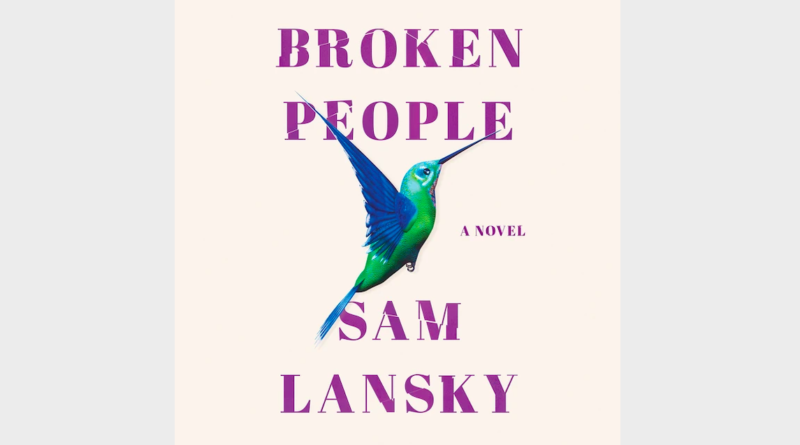REVIEW: ‘Broken People’ by Sam Lansky
Image courtesy of HarperCollins / Provided by official site.
Sam Lansky’s new book, Broken People, is an interesting experiment of mixing different forms of literature into one highly readable and introspective tome. On its surface — literally on its cover — the book is billed as a novel, i.e. a fictional account. However, after reading about the main character of Sam in these nearly 300 pages, and then checking out Lansky’s own biography, it becomes obvious that this is a work very much inspired by the author’s real life. Where the nonfiction world morphs into the fictional world remains a mystery.
Like the protagonist, Lansky is a writer who wrote about his younger years and struggles with drug addiction in a well-received memoir (The Gilded Razor, 2016), and he also grew up in Portland, Oregon; moved to and then away from New York City; and now lives on the West Coast, serving as an editor at Time magazine. This biographical sketch of the author could also serve as a character description of Sam, the protagonist.
In the book, Sam is enticed by a story he hears at a dinner party in Los Angeles. Apparently there is a man who can take away one’s difficulties in life, all within the span of three days. The healing shaman at first seems like a hoax to Sam, too good to be true, but he’s intrigued and wants to know more. He consults with his mystic-loving mother and his best friend up in Portland, and he decides to give it a go. Accompanying him for the journey is Buck, a relatively new friend.
The shaman outlines the plan, which involves the ingestion of ayahuasca, a traditional brew that supposedly inspires deep journeys into the soul and welcomes in a mother spirit. Sam wants to take the three-day retreat because something is missing from his life, but he has been clean for a few years. And this spiritual intervention might cause him to regress.
Still, he decides to go forward with the experiment, and via three lengthy chapters, Lansky outlines exactly what happens to Sam each of the three nights. The “medicine” causes him to take a trip down memory lane, examining his past relationships and the impetus for him moving to Los Angeles in the first place. Several common themes emerge within his personal narrative: the lingering shadow of his drug use at a young age, his insecurity about his body image, his worry of contracting HIV from a partner, his balancing act between staying in or going out to party with people who are not sober or clean.
Each of these passages are fascinating to read. Lansky is a skilled writer who uses an accessible language to lay out the actions of the past and the thoughts of Sam as he experiences each and every episode. There is a lot of quality information about gay identity, dating in the 21st century, friendship and co-habitation, class and money. Eventually Sam recounts a relationship with a man who seems to be the one. This partner is rich and makes a comfortable life for the two of them, including a nice New York City apartment and the prospects of buying a house on the Hamptons, but Sam’s obvious love for him is only outpaced by his self-doubt. He wonders if the entire relationship is a mirage, that one day it will end with a broken heart.
Sam goes through quite the journey of soul-searching over the course of three days, and the readers get to know him and his feelings, emotions, hesitations and the strengths he’s unable to own.
One wonders whether the shaman angle of the story is even needed because such storytelling could be achieved in the present tense, without the trappings of a drug-induced nostalgia trip. There are times when the back and forth between the past and present can be jarring, and like a good dream, the reader wants to stay in the memory for longer, not caring about the present and what the shaman might be concocting next. Also, Buck gets a bit lost in Sam’s introspection. He feels underwritten, yet somehow his role feels necessary.
Lansky has delivered an intricately drawn portrait that has both humorous elements and serious ones. His commentary on the generation of gay men who came of age after the hellish realities of the 1980s and the HIV-AIDS epidemic is important and telling. His thoughts on relationships and how they are framed and impacted by class is another high point. Competing salaries and disposable incomes are always in the back of Sam’s mind when he dates his long-term partner in the book. Finally, his writing about body image and how Sam struggles with his weight and the unrealistic expectations that society places on the individual in this Instagram culture is intriguing to read; the stories and inner-monologues ring of authenticity and sadness.
Broken People is one of the strongest books of 2020, a work that straddles the line between fiction and nonfiction in new and interesting ways. Both Sam and Lansky are worth the read.
By John Soltes / Publisher / John@HollywoodSoapbox.com
Broken People by Sam Lansky. 304 pages. Hanover Square Press. Click here for more information.

